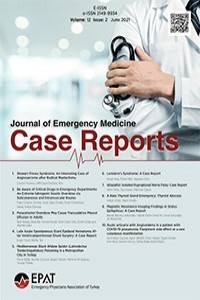SUCCESSFUL TREATMENT OF PULMONARY EMBOLISM AND ASSOCIATED UPPER EXTREMITY ARTERY THROMBOSIS USING INTRAVENOUS ALTEPLASE: A CASE REPORT
Introduction: Although thrombolytic
administration is inevitable in the management of massive pulmonary embolism,
contradictions exist in the treatment of sub-massive pulmonary embolism. There
are drawbacks to thrombolytic treatment due to potential serious side effects
such as cranial hemorrhage. Case Report: An 84-year-old female patient was
admitted to the emergency service because of pain and lack of a pulse in her
right arm and %61 oxygen saturation without any respiratory system complaints.
A computerized tomography showed pulmonary embolism close to totality in the
bilateral main pulmonary arteries and peripheral embolism in the right brachial
artery. We considered a sub-massive pulmonary embolism in this patient with no
hypotension despite bilateral pulmonary artery embolism, good general
condition, but a dilated right ventriculi in transthoracic echocardiography.
Since the PESI score was 115, it was decided that the patient was in the
high-risk group. After administration of 100 mg Alteplase as thrombolytic
therapy, her oxygen saturation increased to 95% in the room air and her
complaint of right arm completely regressed. Furthermore, none of the possible
complications from thrombolytic therapy, such as fatal bleeding, were observed
in our patient. Conclusion: In this article, it is emphasized
that thrombolytic therapy is an appropriate choice for patients with
sub-massive pulmonary embolism and acute arterial embolism.
___
- 1. Teleb M, Porres-Aguilar M, Anaya-Ayala JE, Rodriguez-Castro C, Porres-Muñoz M, Mukherjee D. Potential role of systemic thrombolysis in acute submassive intermediate risk pulmonary embolism: review and future perspective. Ther Adv Cardiovasc Dis 2016; 10(2): 103–10.
- 2. Long B, Koyfman A. Current Controversies In Thrombolytic Use In Acute Pulmonary Embolism. The Journal of Emergency Medicine 2016; 51(1): 37–44.
- 3. Baile´n MR, Cuadra JA, Aguayo De Hoyos E. Thrombolysis During Cardiopulmonary Resuscitation In Fulminant Pulmonary Embolism: A Review. Crit Care Med 2001; 29: 2211–9.
- 4. Konstantinides S, Geibel A, Heusel G, Heinrich F, Kasper W. Heparin plus alteplase compared with heparin alone in patients with submassive pulmonary embolism. N Engl J Med 2002; 347: 1143–50.
- 5. Sharifi M, Bay C, Skrocki L, Rahimi F, Mehdipour M. Moderate pulmonary embolism treated with thrombolysis (from the MOPETT trial). Am J Cardiol 2013; 111: 273–7.
- 6. Gao G, Yang P, Liu M, Din M, Liu G, Tong Y, et al. Thrombolysis for acute intermediaterisk pulmonary embolism: a meta-analysis. Thromb Res 2015; 136: 932–7.
- 7. Kearon C, Akl EA, Ornelas J, Blaivas A, Jimenez D, Bounameaux H, et al. Antithrombotic therapy for VTE disease: CHEST guideline and expert panel report. Chest 2016; 149: 315-52.
- 8. Van der Hulle T, Kooiman J, Den Exter PL, Dekkers OM, Klok FA, Huisman MV. Effectiveness and safety of novel oral anticoagulants as compared with vitamin K antagonists in the treatment of acute symptomatic venous thromboembolism: a systematic review and meta-analysis. J Thromb Haemost 2014; 12(3): 320-8.
- 9. Christine GK, Gregory JF, William FP, Phil SW, Christopher WB, Veronica A, et al. Association between rivaroxaban use and length of hospital stay, treatment costs and early outcomes in patients with pulmonary embolism:a systematic review of real-world studies. Current Medical Research and Opinion 2017; 33(9): 1697-703.
- 10. Işık GC, Çorbacıoğlu SK, Cevik Y. Watershed Infarct due to Massive Pulmonary Embolism: A Rare Diagnosis at the Emergency Department. JEMCR 2016; 7: 34-6.
- 11. Zhang HL, Liu ZH, Luo Q, Wang Y, Zhao ZH, Xiong CM. Paradoxical embolism: Experiences from a single center. Chronic Diseases and Translational Medicine 2017; 3: 123-8.
- Başlangıç: 2010
- Yayıncı: Alpay Azap
Sayıdaki Diğer Makaleler
Esra OZCAKIR, Serpil SANCAR, Gokhan ORCAN, Mete KAYA
Hung-lin HSU, Chien-chin HSU, Kuo-tai CHEN
Gülhan GÜLHAN GÜREL, Hikmet SACMACI
Muhammet ARSLAN, Sinan SOZUTA, Enver REYHAN
Kivanc KARAMAN, Cihangir CELİK, Alten OSKAY, Hamit Hakan ARMAĞAN, Onder TOMRUK
Ercan AYAZ, Ahmet AKTAN, Abdullah ALİMOĞLU, İdris OZDAS
Cristina BOLOGA, Catalina LİONTE, Manuela URSARU, Laurentıu SORODOC, Elena Adorata COMAN, Gabriele PUHA, Ovidiu Rusalim PETRİS
Ozlem TALU KENDİR, Hayri Levent YILMAZ, Seyda Beğen DOĞANKOC, Sevcan BİLEN, Sinem SARI GOKAY, Mihriban Ozlem HERGUNER
